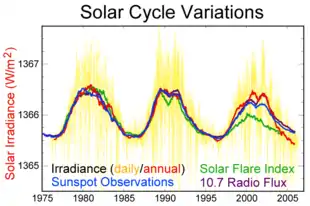Solar cycle 18
Solar cycle 18 was the eighteenth solar cycle since 1755, when extensive recording of solar sunspot activity began.[1][2] The solar cycle lasted 10.2 years, beginning in February 1944 and ending in April 1954. The maximum smoothed sunspot number (SIDC formula) observed during the solar cycle was 218.7 (May 1947), and the starting minimum was 12.9.[3] During the minimum transit from solar cycle 18 to 19, there were a total of 446 days with no sunspots.[4][5][6]
| Solar cycle 18 | |
|---|---|
| Sunspot data | |
| Start date | February 1944 |
| End date | April 1954 |
| Duration (years) | 10.2 |
| Max count | 218.7 |
| Max count month | May 1947 |
| Min count | 12.9 |
| Spotless days | 446 |
| Cycle chronology | |
| Previous cycle | Solar cycle 17 (1933–1944) |
| Next cycle | Solar cycle 19 (1954–1964) |
Cycle 18 was characterized by "giant" sunspots.[7] The recording of the 10.7 cm (2800 MHz) solar radio flux began partway during this cycle,[8] and values of the solar flux during this cycle turned out to be particularly high.[7]
See also
References
- Kane, R.P. (2002), "Some Implications Using the Group Sunspot Number Reconstruction", Solar Physics, 205 (2): 383–401, Bibcode:2002SoPh..205..383K, doi:10.1023/A:1014296529097
- "The Sun: Did You Say the Sun Has Spots?". Space Today Online. Retrieved 12 August 2010.
- SIDC Monthly Smoothed Sunspot Number. ""
- Spotless Days. ""
- Dr. Tony Phillips (11 July 2008). "What's Wrong with the Sun? (Nothing)". NASA.
- Solaemon's Spotless Days Page. ""
- Dodson, Helen W.; Hedeman, E. Ruth; Mohler, Orren C. (August 1974). "Comparison of activity in solar cycles 18, 19, and 20". Reviews of Geophysics. 12 (3): 329–341. Bibcode:1974RvGSP..12..329D. doi:10.1029/RG012i003p00329.
- Petersen, Edward (2012). Single Event Effects in Aerospace. Wiley. p. 20. ISBN 1118084306.
This article is issued from Wikipedia. The text is licensed under Creative Commons - Attribution - Sharealike. Additional terms may apply for the media files.
